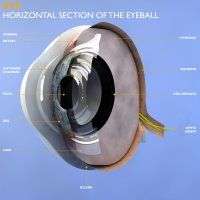Imagine trying to succeed at work at school if you could not see clearly. Unfortunately, that's the reality for far too many people in the world. Whether they cannot afford eye care, are blind or have a vision disability, poor eyesight makes life much more difficult. You can make a difference this holiday
Read more
Vitreous disorders are various conditions that affect the gel-like substance (vitreous) inside the eye that helps the eye keep its round shape. Some of these conditions create only minor vision disturbances while others may be a sign of more serious eye problems. The following are some common vitreous disorders.
Vitreous Detachment
The vitreous has millions of tiny fibers running through it. These attach to the light-sensitive layer of tissue on the back of the eye, the retina.
The vitreous slowly shrinks as you grow older, which causes the fibers to tug on the surface of the retina. This does not usually cause any damage the retina because the fibers break. However, it does allow the vitreous to separate from the retina.
The main symptom of vitreous detachment is floaters in your field of vision. These appear as floating specks or “cobwebs” that dart out of the way when you try to look at them. Sometimes, you may also notice a small but sudden increase in the number of floaters accompanied by flashes of light in your side vision (i.e., peripheral vision).
Other than floaters, vitreous detachment does not usually cause any vision problems. Occasionally, though, when the fibers pull on the retina, they may create a hole in the macula or cause the retina to detach. Both of these can damage your vision and should be treated promptly.
Vitreomacular Adhesion
If the vitreous does not detach completely from the center part of the retina (macula), it can lead to a vitreomacular adhesion. (The macula is needed for sharp center vision.) If the vitreous fibers that are still attached to the macula pull hard enough, they can cause vision changes in the central vision, such as:
- Blurriness
- Decreased vision
- Vision loss in the center (in severe cases)
If you suffer from vitreomacular adhesion, your ophthalmologist may suggest waiting and monitoring the condition to determine whether symptoms get worse. If the symptoms get worse, medication or surgical intervention may become necessary to address the problem.
Uveitis
Uveitis is a type of inflammatory disease that leads to swelling and destruction of the tissues of the eye. This can affect many parts of the eye, including the vitreous, retina, optic nerve, lens and the uvea.
This condition can cause reduced vision or blindness, depending on the part of the eye that is affected. Inflammation of the vitreous, known as intermediate uveitis, has been linked to several other health conditions, such as multiple sclerosis and sarcoidosis.
What to Do If You Think You May Have a Vitreous Disorder
If you experience a sudden change in vision, including an increase in flashes of light in your side vision or in the number of floaters, have your eyes examined by your ophthalmologist right away, as this may be a sign of a serious vision problem.
If you notice gradual changes in your vision or are overdue for your routine eye exam, contact us to schedule an appointment today. Your eye health may depend on it.
-
Vision Charities to Help You Give Back This Holiday Season
Category: Newsletters, Amazing, Interesting Eyes
-
Eyeball Licking: A Dangerous New Trend?
Category: Newsletters, Amazing, Interesting Eyes
In the summer of 2013, news spread quickly about a dangerous new trend, called "worming" or oculolinctus, and a serious outbreak of disease among Japanese youth. Upon further investigation, many news sources retracted or amended previously published stories, saying the stories of a sudden increase in
Read more -
Teaching Kids About Pink Eye
Category: Newsletters, Kid's Vision
Conjunctivitis is by no means limited only to children. An infection or inflammation of the conjunctiva -- the membrane within the eyelid and protecting the white aspect of our eyes -- can occur in individuals of any age secondary to an infection, an allergic reaction or chemical irritation. Infectious
Read more -
How Vision Problems Affect Learning
Category: Newsletters, Kid's Vision
Reading is an instrumental part of your child’s ability to learn. In order to write complete sentences or do mathematical problems, a child must first be able to understand what is on the page in front of them. If your child is suffering from vision problems, it may be drastically interfering with
Read more -
Getting Kids to Wear Glasses
Category: Newsletters, Kid's Vision
In most of North America, optometrists are known as Doctors of Optometry (D.O.). As physicians, they are able to diagnose eye disease and prescribe medications or corrective lenses. Licensure as a DO requires a Bachelor's Degree and successful completion of a four-year school of optometrics. Educational
Read more -
Allergy Management and Your Eyes
Category: Newsletters, Tips for Healthy Eyes
For those who suffer from allergies, exposure to pets, pollen, or dust mites can quickly lead to red, itchy, watery eyes. Although seasonal allergies are notorious for causing eye symptoms, year-round exposure to allergens can be just as problematic. If you develop itchy, red, irritated, puffy, or watery
Read more -
5 Things You Can Do to Protect Your Eye Health
Category: Newsletters, Tips for Healthy Eyes
Protecting your eyesight is an important part of maintaining your quality of life. Here are five simple things you can do to help preserve your vision. 1. Stop Smoking It is no secret that smoking is strongly linked to many health problems; however, did you know that it can also damage your eyes and
Read more -
Blue Light Exposure: What Is It?
Category: Newsletters, Conditions That Affect Vision
-
Is Office Lighting Affecting Your Vision?
Category: Newsletters, Tips for Healthy Eyes
Do your eyes hurt, burn or itch after a day at work? Poor lighting may be to blame for your symptoms. Many companies use inexpensive fluorescent lighting to light large areas because it's a fairly inexpensive option. Unfortunately, your eyes pay the price. What Kinds of Eye Problems Can Fluorescent
Read more -
Itchy Eyes and Contact Lenses: What to Do When the Itch Won't Stop
Category: Newsletters, Contacts
Have you stopped wearing your contacts because your eyes itch? Find out what you can do to end the itch.
Read more -
Frame Your Face: Which Frames Look Best?
Category: Newsletters, Glasses & Frames
Finding frames that fit your face, your style and your budget isn't always so easy. It's tempting to just pick the first pair of frames that are barely acceptable than face the daunting task of sorting through hundreds of frames to find the perfect option. Luckily, there are a few tricks you can use
Read more
